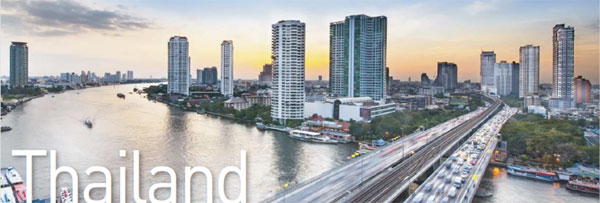Heading in the right direction


Next year, ASEAN's 10 members will take a major step toward greater regional economic integration when they set up a single market
The ASEAN Economic Community (AEC) will facilitate the free movement of goods, services and investments throughout the region, and Thailand, already the second-largest economy in Southeast Asia, is readying itself to take advantage of the opportunities this economic integration will bring.
"Located at the crossroads of Asia, Thailand provides easy access to the region's dynamic markets, including its own booming domestic consumer market of 67 million people," says Chartsiri Sophonpanich, president of Bangkok Bank Public Company Limited, the country's largest lender.
"The AEC will be an important growth driver, creating competitive advantages for all member states. Thai companies are already moving out into the region. This will help generate capital investment, as well as job opportunities. Thailand has been part of the supply chain of many different industries, but now that labor costs have risen, it is very important to work with our neighbors and to increase investment throughout the region so we can keep our prime position," adds Sophonpanich. "We will see stronger relationships between ASEAN and Asian countries from now on. What's more, China will play an important role in this process. Full ASEAN integration will be critical for the future of the region and will create a large amount of investment opportunities for locals and foreigners," he says.
Thailand has enjoyed steady growth over the last two decades, led by strong exports and a vibrant domestic consumer market. Abundant natural resources and a skilled and cost-effective workforce, along with investor-friendly legislation, have attracted foreign companies from throughout the region.
This process has been aided by modern transport infrastructure connecting it to its neighbors Laos, Cambodia, and Vietnam. The country also has seven international airports, six deep-sea ports, and two international river ports.
Thailand's infrastructure development plans between now and 2022 include a high-speed rail network that will connect with southern China through Laos. Bangkok's mass transit system is being expanded into the suburbs. Air and marine transportation will also be strengthened as demand, driven by deeper AEC integration, continues to increase.
"Membership of the AEC will bring huge benefits to the entire Thai economy, because Thailand is at the geographical center of ASEAN. Right now, everyone in Thailand, every organization and sector - especially the business community - is mentally prepared for the AEC," says Boonyong Yongcharoenrat, president of the Thai Young Chinese Chamber of Commerce, adding: "A lot of Chinese companies have already come to Thailand. From now on, Thailand will become the distribution center for ASEAN."
The country's well-defined investment policies focus on liberalizing and encouraging free trade. Foreign investment is being actively promoted, especially when it contributes to skills development, technology, and innovation. It has focused on attracting investment to certain key sectors: agriculture and agro-industry, alternative energy, automotive, electronics, ICT, and fashion, and value-added services including entertainment, healthcare and tourism.
Thailand consistently ranks among the most attractive investment locations in international surveys. The World Bank's 2014 Ease of Doing Business report places Thailand as the 18th easiest country in the world (and fifth-ranked country in Southeast Asia) in which to do business. Likewise, the 2014 United Nations Conference on Trade and Development (UNCTAD) places Thailand as the 8th most attractive host economy in the world.
Numerous state agencies, including the Thailand Board of Investment (BOI) support investors, and a range of tax incentives, support services, and import duty exemptions or reductions for an extensive list of promoted activities are available.
Companies receiving investment promotion privileges from the BOI are not subject to foreign equity restrictions in the manufacturing sector. There are no local content requirements or export requirements, as Thailand's investment regime is in total compliance with World Trade Organization regulations.
The Board of Investment coordinates the activity of the One-Stop Service Center for Visas and Work Permits, which issues work permits and long-term visas to foreign staff of BOI-promoted companies within three hours or less, as well as administering the One Start One Stop Investment Center, which opened in November 2009 to facilitate a full range of services and streamline investment procedures by bringing representatives from more than 20 state agencies under one roof.
(China Daily European Weekly 07/04/2014 page12)
Today's Top News
- New engine powers cargo drone expansion
- China to boost intl cooperation on green tech
- Factory activity sees marginal improvement in November
- Venezuela slams US' 'colonial threat' on its airspace
- Xi: Strengthen cyberspace governance framework
- Takaichi must stop rubbing salt in wounds, retract Taiwan remarks






























